Key takeaways:
- Resilience and authenticity are crucial for filmmakers; storytelling should come from the heart and embrace personal experiences.
- Collaboration and open communication foster creativity; diverse perspectives and input from team members can transform projects.
- Networking and embracing feedback are essential for growth; opportunities often arise from genuine connections and constructive criticism.
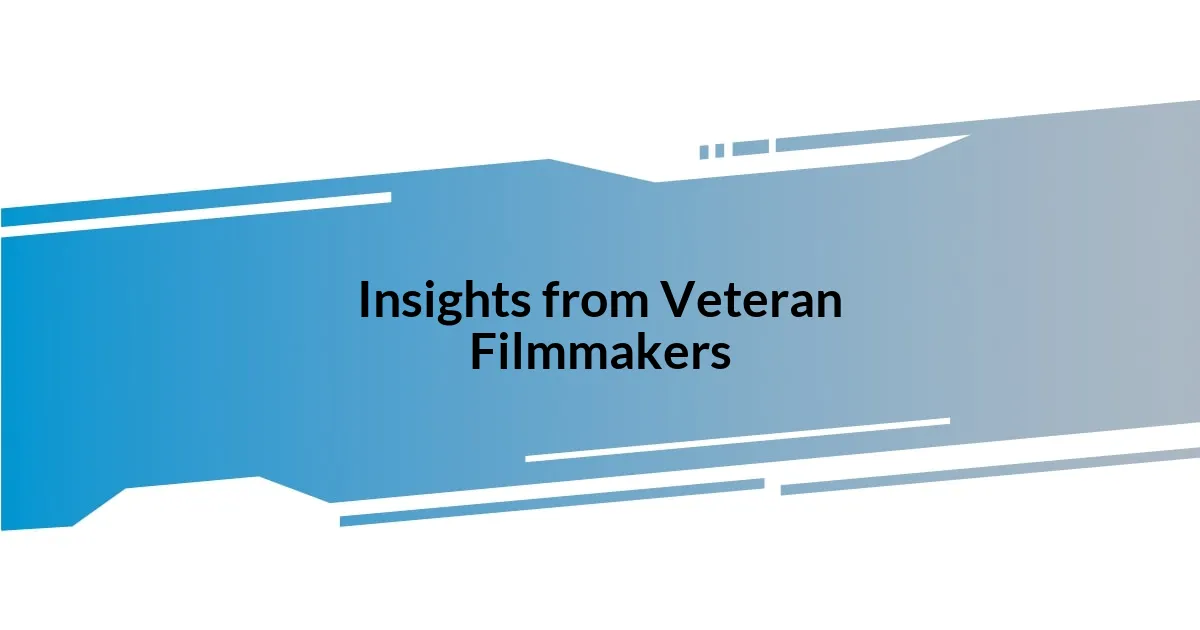
Insights from Veteran Filmmakers
One insight that consistently resonates with me from veteran filmmakers is the importance of resilience. I recall a seasoned director sharing how his first major project encountered countless setbacks—financing issues, cast changes, and even a near cataclysmic weather event during shooting. His candid acknowledgment of these hurdles made me realize that every film journey includes its own storm; the key is staying committed despite the chaos.
Another poignant lesson I learned revolves around storytelling and its emotional core. A legendary screenwriter once advised me, “Always write from your heart; audiences can sense insincerity.” It made me reflect on my own projects and the times I’d held back my true voice. Engaging with your audience isn’t just about what you present; it’s about how authentically you present yourself. How often do we challenge ourselves to dive deeper into our personal experiences when crafting our narratives?
Lastly, I found an interesting perspective on collaboration from an experienced cinematographer. He emphasized that film is undeniably a team sport, where the collective vision nurtures creativity. He told me how he once had a young assistant bring a fresh idea that changed the entire outlook of a scene. It’s moments like these that beg the question: Are we really open to input from those around us? Trusting others not only enriches the process but often leads to surprising and transformative outcomes in the final product.
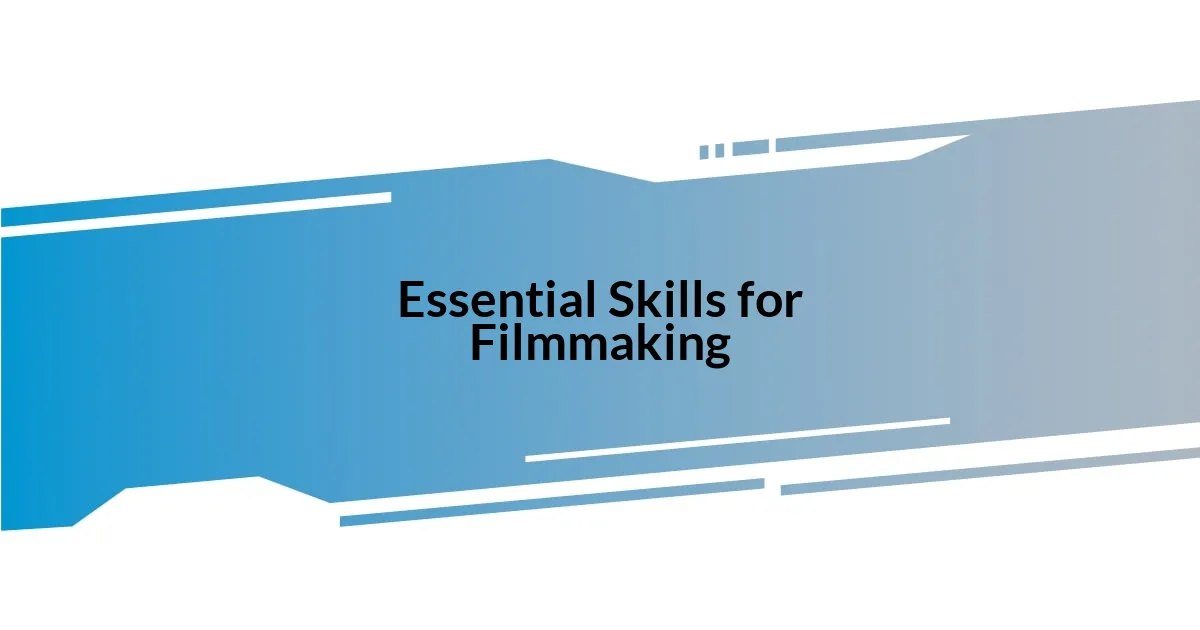
Essential Skills for Filmmaking
Filmmaking demands a mix of diverse skills that can elevate a project from mediocre to memorable. One essential skill is adaptability. I remember being on a set where everything seemed to go wrong at once: a key actor fell ill, our primary location became unavailable, and we were stuck with a looming deadline. Rather than panicking, we brainstormed alternatives and ended up crafting a scene from a fresh perspective. This flexibility not only salvaged our shooting schedule but also brought an unexpected brilliance to the film.
Another critical skill is effective communication. Each member of a film crew possesses a unique vision and expertise. I once collaborated with a production designer who had a completely different interpretation of a set’s mood. Instead of dismissing her ideas, we discussed and fused concepts, resulting in a visual storytelling dynamic that I hadn’t anticipated. This dialogue made me appreciate how important it is to create an environment where ideas can flow freely, leading to stronger collaborations and richer storytelling.
Finally, technical proficiency cannot be overlooked. Having a solid grasp of camera work, sound design, or editing software can significantly enhance the filming process. I remember sitting alongside an experienced editor who effortlessly navigated editing software. Watching him piece together footage with such skill not only inspired me, but it showcased how a filmmaker who understands the technical aspects can more effectively communicate their vision. In filmmaking, knowing the tools of the trade can make all the difference.
| Skill | Description |
|---|---|
| Adaptability | The ability to pivot during unforeseen circumstances and find creative solutions. |
| Effective Communication | Fostering open dialogue among team members to promote collaboration and idea-sharing. |
| Technical Proficiency | Understanding and mastering the tools and software essential for bringing your vision to life. |
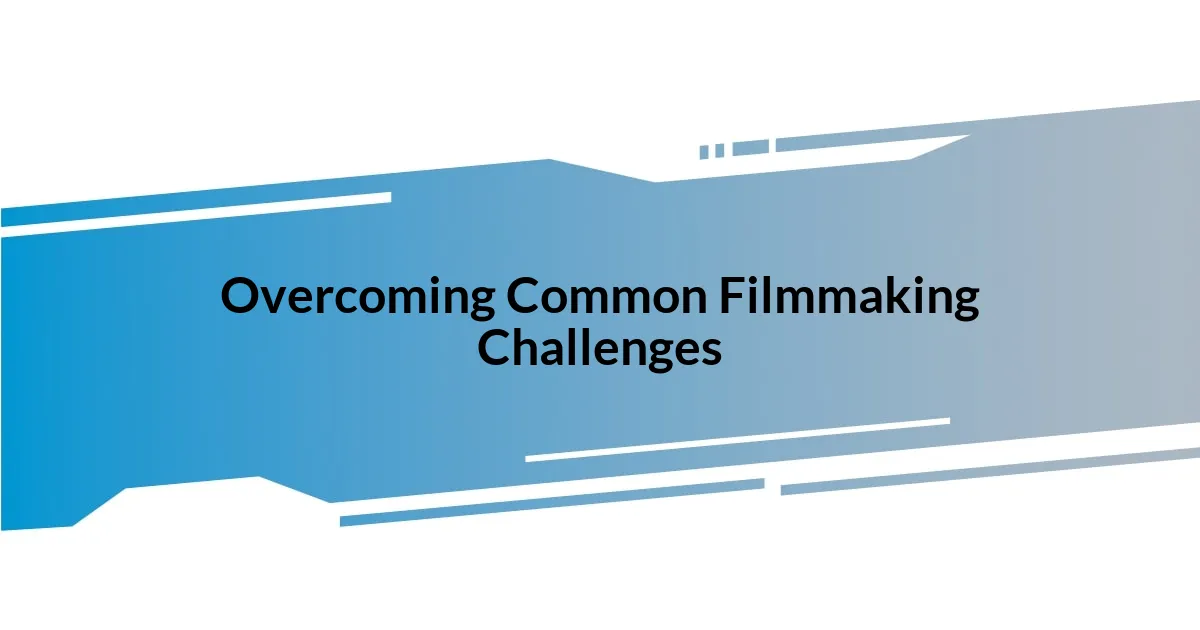
Overcoming Common Filmmaking Challenges
Navigating the challenges of filmmaking can sometimes feel like trying to steer a ship through choppy waters. I remember one particular shoot where our primary location fell through just days before filming. Everyone’s spirits were low, but we gathered as a team, brainstorming alternatives, and eventually secured a breathtaking outdoor site that not only fixed our location issue but also added a stunning visual depth to the film. This experience taught me that embracing challenges can lead to serendipitous outcomes, turning setbacks into opportunities for creativity.
Here are a few strategies that I’ve picked up from seasoned filmmakers on overcoming common challenges:
- Stay Flexible: Be open to changing plans. Adaptability can make a huge difference when the unexpected arises.
- Cultivate Team Unity: Building a supportive environment encourages collaboration and sparks innovative solutions during tough times.
- Maintain a Positive Mindset: Keeping a sense of humor and a positive outlook can help alleviate stress and inspire your team when faced with obstacles.
- Seek Diverse Perspectives: Engaging your crew for their input can lead to innovative solutions that might never have crossed your mind.
Filmmaking is truly a collective journey; when we lean on each other, we often find the most powerful solutions to our challenges.
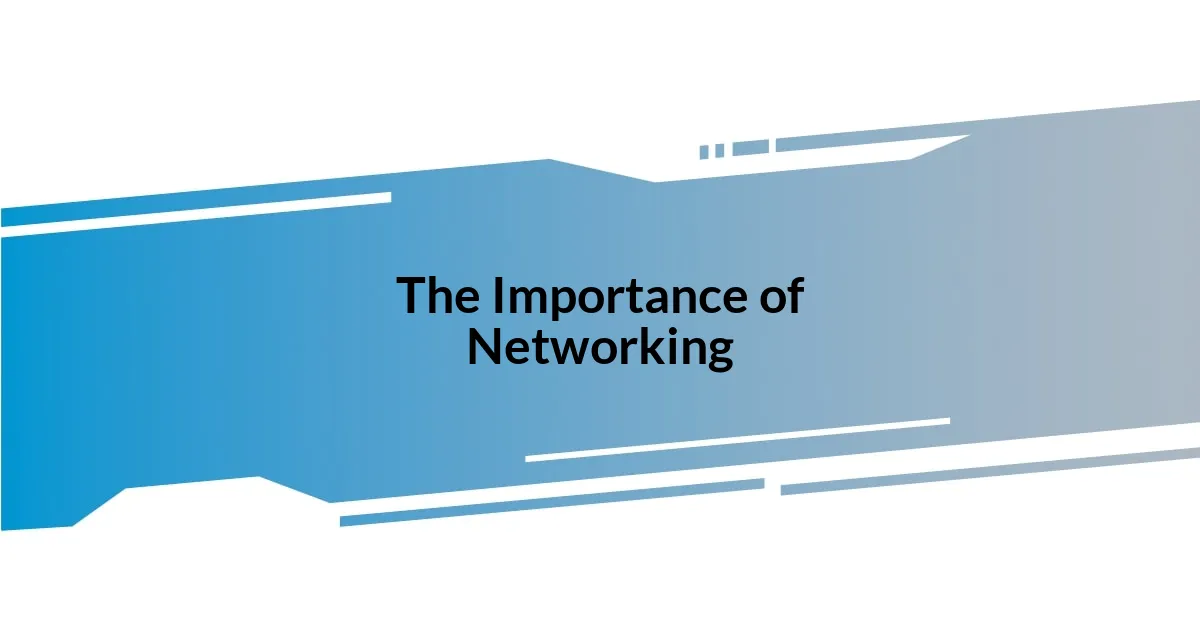
The Importance of Networking
The connections I’ve forged in the industry have often become lifelines during pivotal moments. At an indie film festival, I struck up a conversation with a cinematographer who ended up mentoring me on lighting techniques. It’s fascinating how one casual chat can shape your understanding and approach to filmmaking.
Networking isn’t just about exchanging business cards; it’s also about building genuine relationships. I’ve attended numerous industry events, and each time I left with new friends and collaborators. Think about it—who doesn’t feel energized after meeting someone passionate about their craft? Those interactions don’t just enhance your knowledge; they create a sense of community that can be incredibly supportive.
I’ve learned that most opportunities don’t knock on your door; they happen when you’re out there, connecting with others. I remember a discussion over coffee that turned into an invitation to co-direct a short film. Would I have taken that leap without the network I built? Probably not. Maintaining those relationships and showing kindness often lead to unexpected doors opening.
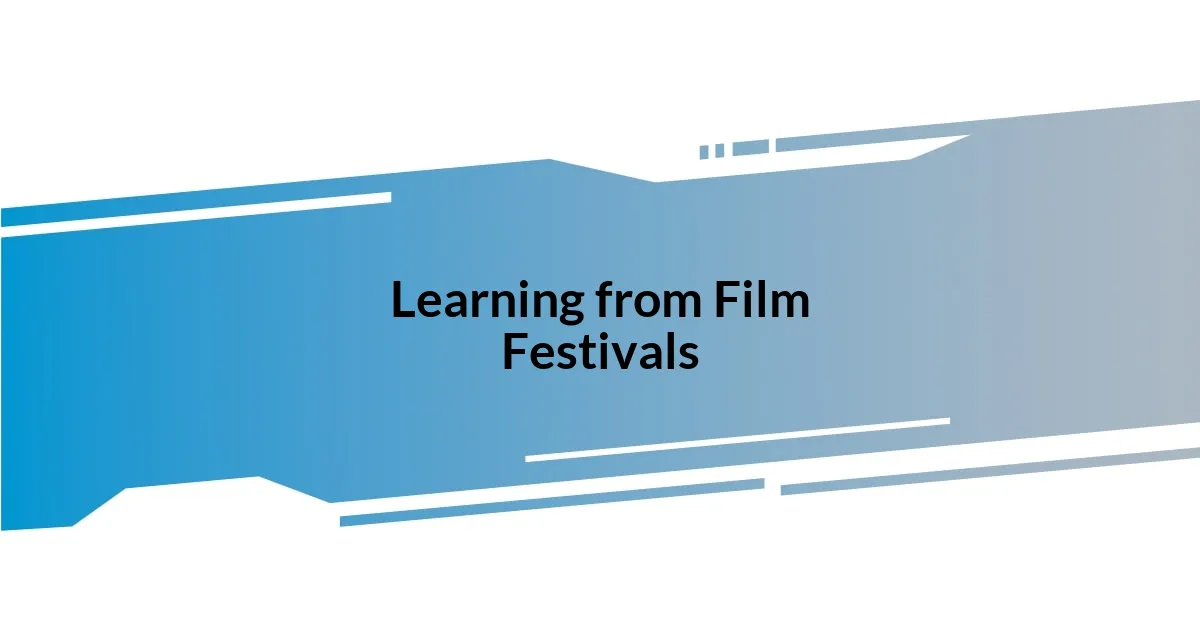
Learning from Film Festivals
Attending film festivals has offered me valuable insights that I treasure deeply. I remember sitting in a dimly lit theater, surrounded by fellow filmmakers, watching a remarkable indie film that touched my heart. It was an eye-opening experience that reminded me how storytelling transcends technical skill; it’s about connecting with emotions. Have you ever found yourself lost in a film, forgetting the world around you? That’s the magic that festivals can showcase, illuminating the kind of storytelling I strive to achieve in my own work.
Festivals also provide a unique opportunity to watch Q&A sessions with directors and cast members. I attended one where the filmmaker discussed the hurdles they faced during production. They openly shared their struggles with funding and casting choices, making their triumphs feel more relatable. This honesty resonated with me, as it highlighted that every creator faces obstacles. I left that session inspired and more determined than ever to tackle my own projects, knowing that vulnerability can ultimately lead to growth.
The feedback from audience screenings at festivals can be a treasure trove of learning. I took part in one event where my short film was screened, and I felt my heart race with anticipation. The post-screening discussion opened my eyes to viewpoints I hadn’t considered. How valuable it is to see your work through a different lens! Those critiques helped me refine my craft and reminded me that every piece of feedback is an invaluable tool for improvement.
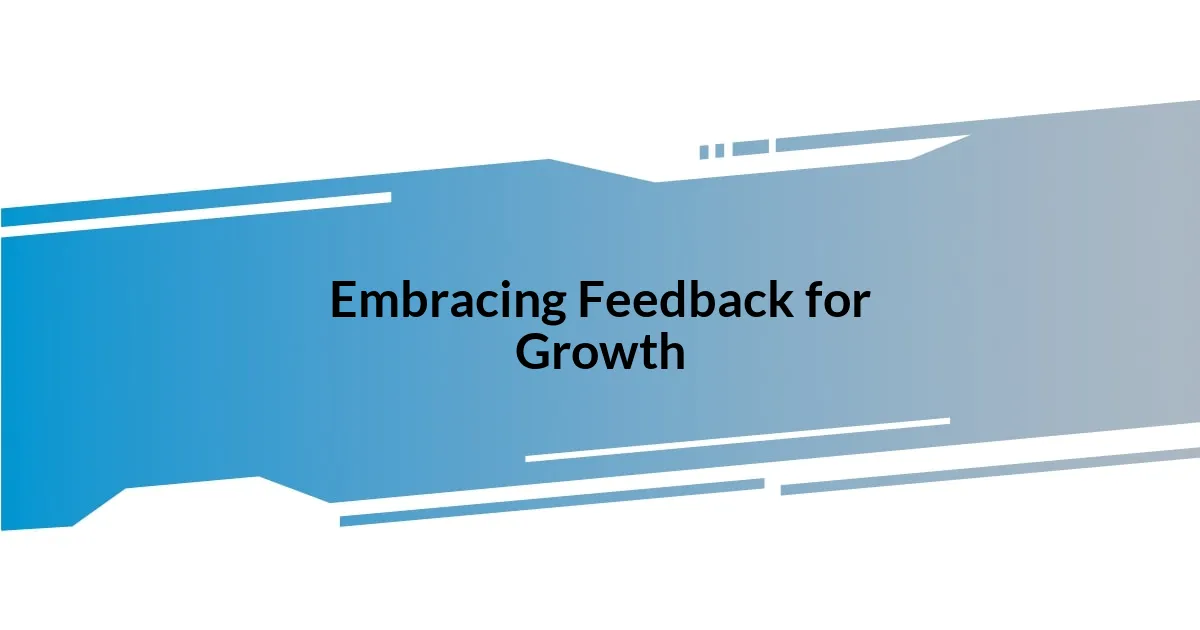
Embracing Feedback for Growth
Embracing feedback has been one of the most transformative aspects of my filmmaking journey. I vividly recall a mentor of mine watching my first short film and offering what felt like harsh critiques. At first, it stung—who doesn’t want to believe their work is perfect? But over time, I learned that it was precisely these tough conversations that pushed me to elevate my craft and explore new storytelling techniques. Have you ever felt that initial rush of defensiveness when someone critiqued your work? It’s natural, but I’ve learned to quiet that voice and focus on the growth that critique can inspire.
During a workshop led by an experienced director, I engaged in a peer review session that shifted my perspective completely. As I listened to others dissect my scenes, I found myself surprised by the insights they offered. It was enlightening to see my work through their eyes—they pointed out subtle details I had never considered. This experience taught me the profound power of diverse viewpoints, showing me how collaboration can turn a decent film into something truly exceptional. How often do we underestimate the knowledge of our peers in this industry?
Some of my most significant breakthroughs have come from feedback that initially felt uncomfortable. I remember screening my documentary to a group of seasoned filmmakers, and their candid reactions were a mixed bag. While some praised the visuals, others questioned my narrative choices. The feeling of vulnerability was palpable, but it was in that discomfort that I found clarity. Learning to cherish each piece of feedback, whether positive or critical, has been a game-changer for me. When was the last time you embraced constructive criticism? It can be daunting, but that’s where true growth begins.
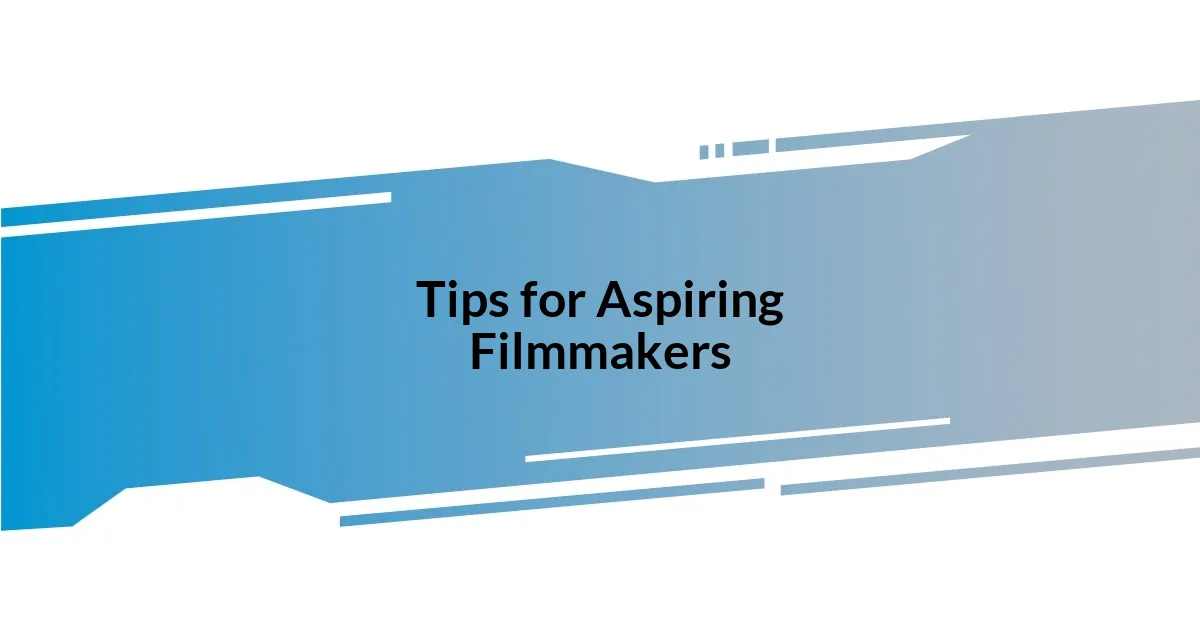
Tips for Aspiring Filmmakers
One vital tip for aspiring filmmakers is to never stop exploring your creative instincts. I remember attending a workshop where a seasoned director encouraged us to experiment without fear. He said that some of his best moments came from improvisation on set. Have you ever had a sudden burst of inspiration but hesitated to act on it? Trusting those instincts can lead you to unexpected and impactful storytelling paths.
Networking is another crucial aspect. I’ll never forget the day I met a fellow filmmaker at a coffee shop, and we struck up a conversation about our projects. This simple connection blossomed into a collaboration that pushed my work to a new level. It made me realize that sometimes, opportunities come from the least expected places. Have you ever considered how a casual interaction could lead to your next big project?
Lastly, be patient with your journey. Filmmaking is a marathon, not a sprint. There were times I felt disheartened, waiting for my projects to gain recognition. However, I found solace in knowing that every step, every failure, and every small success builds towards something greater. It’s essential to remember that growth in this industry often happens behind the scenes. How often do we forget to celebrate the small victories? Each one contributes to the larger tapestry of our creative lives.
